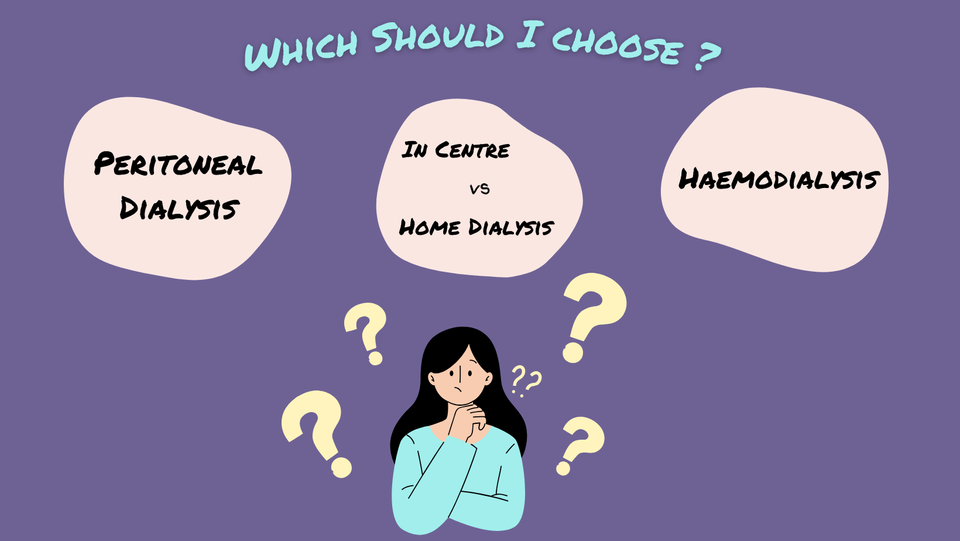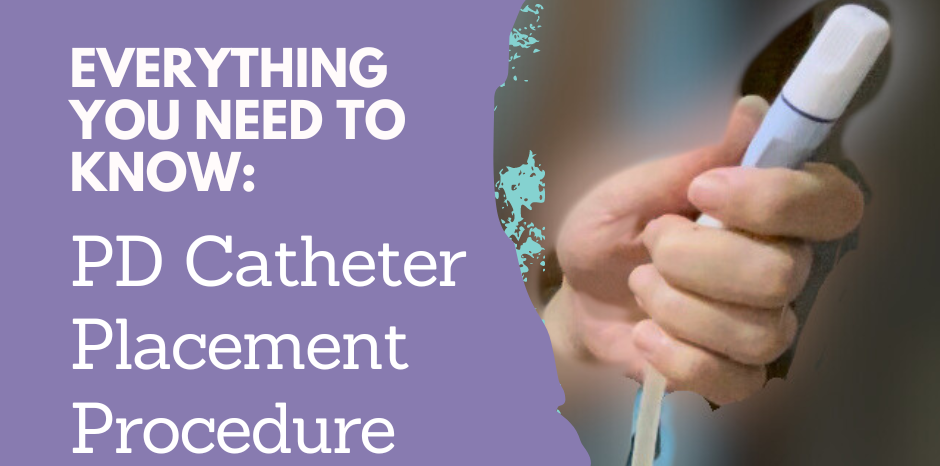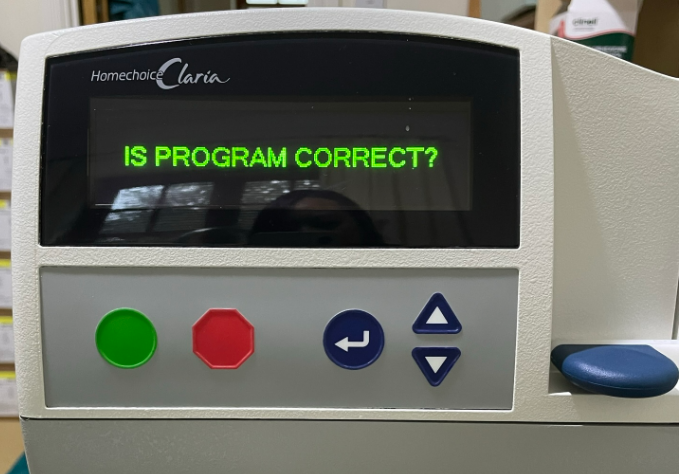How to Choose between Home Peritoneal Dialysis and In-Centre Haemodialysis?

Hello Everyone!🤗
This question is something that I am asked by many prospective dialysis patients and they are always looking for a short, straight, binary answer. Unfortunately, there is no one size fits all answer to this question, as every form of dialysis has its advantages and disadvantages and one person’s experience on one form of dialysis will differ to another person. More importantly, the type of dialysis truly has to suit the individual and their lifestyle for it to be successful.
However, I do understand the struggle of this question. Whether you are a prospective dialysis patient waiting in the wings of Stage 4 of CKD or have crash landed into kidney failure. It feels like you never have enough time to get your head around which dialysis option you should choose. It is all the harder, if you are coping with the many foggy brained and fatigued symptoms of kidney failure already. Making such a decision almost feels like a stab in the dark!
But, I don’t want to leave you all high and dry and completely dodge this question entirely. Instead, I have thought about the 4 dimensions over which you can consider when making your decision on what type of dialysis to choose. In each case I will try to give my personal context and decision for Home Automated Peritoneal Dialysis (APD) using a machine but will try to give some alternative perspectives such as Continuous Ambulatory Peritoneal Dialysis (CAPD) aka manual bags and In-centre Haemodialysis (HD). I will not be touching Home Haemodialysis as I have had no experience nor met anyone who has shared their experience of it in depth but that is an option out there!
At the end of the post, I will also include a freebie printable of a number of questions across these four dimensions that you can ask yourself and ponder on. By the end, I hope the answer of which form of dialysis that will best suit your situation shall reveal itself to you!
Or at the very least, provide a helpful focal point to guide you through what feels like an all encompassing and impossible decision.
The 4 Dimensions to tackle the dialysis decision-making process?
(1) Career and Education
(2) Family and Social Commitments
(3) Personality and Temperament
(4) Age and Your Kidney Donation Options
Career and Education

In my opinion, I am a firm believer that after some recovery time and settling in period of about maybe 6 months on dialysis, most people are capable to returning to work and continuing with a generally normal existence of working life. Of course, take as much time as you need to recover from the ordeal that is kidney failure and adjustments to dialysis but I think having a job or going back into education is very normalising experience and can give back purpose, self-fulfilment and a sense of achievement back into your life and of course money to pay the bills. In the case of education, I think with necessary adjustments by school, college or university it is entirely possible to continue learning and you will benefit greatly from not taking too long of a gap in your learning, which after some time can be intimidating to return to.
Depending on how long you think will be waiting for a kidney transplant, it may be a fair decision to take a year out of working or education but I find that languishing at home can be very exhausting. I found myself restless at home, guilty and general sense of wellbeing went down as I felt my life was going nowhere on dialysis. Even a simple part-time job or volunteering when you are on sick leave can be good to just keep your life moving forward and generating new daily experiences for you and retaining your mental health and general confidence!
Ultimately, you will want to look at what your commitments are at work or in school and think which form of dialysis will best suit your lifestyle. Will you be approaching this decision as "dialysis should fit around my work/education schedule" or "my work/education schedule should fit around my dialysis schedule".
Example Scenarios - Education
(1) Student at University living in dorms
Home APD - Seek adjustments with your university for a larger room with ensuite. Perform dialysis in the night.
Manual CAPD - Perform CAPD in between lectures.
In Centre HD - Perhaps more tricky if there are no convenient slots to fit your schedule.
(2) Student Remote Learning From Home
Home Dialysis seems preferable here if accommodation and temperament allows.
(3) Part-time Education Alongside Work
Home Dialysis will give you the flexibility to manage a busy schedule but equally if you can fix your commitments around an in-centre schedule it can also be possible. However, you will have to commit to studying or working whilst on dialysis in either case.
Manual CAPD will do well if you prefer not to be work/study on dialysis. Multiple 30 min sessions on dialysis can act as your breaks.
(4) Public and Professional Exams
It is entirely possible but it can be more stressful experience whilst on dialysis. You will need to consider your temperament if you can handle the extra stress of home dialysis and studying. You may even have to study whilst on dialysis. In-centre dialysis may be preferable if the commute is not excessive and you can study in hospital setting.
I passed professional exams on Home PD. Excessive stress on dialysis is not something my body could tolerate, especially my blood pressure. To protect my heart, I took a deferred year(s).
(5) High School / Middle School Student
If not facing any public exams. All options of dialysis are open to you. Pick the one that will make you feel the happiest while at school. You might say to pick in-centre dialysis to skip school days. But you will likely have to catch up on lesson plans during dialysis or in the evenings! A lot of youngsters I meet prefer being in school with their peers for semblance of normal life!
By no means are these examples are "Correct" solutions but rather proposed solution for someone in this scenario. I urge you to think deeply and make this decision yourself. Considering the remaining dimensions to follow.
Example Scenarios - Work
(1) Full Time Desk Job
Speaking with your employer will be key as to what adjustments you can receive. A desk job is likely to lend well to all forms of dialysis. Particularly home dialysis if you can take remote days.
Most offices these days have a quiet room for breastfeeding or multi-purpose/faith room. If you choose manual CAPD, 30mins sessions across the work day is entirely possible.
(2) Full Time Job with Travel
If your job requires frequent travel and extended days away from home. I can only suggest manual CAPD. It doesn't require you to take a heavy printer size machine. But you will still need to bring along fluid bags of dialysate and the rest of the ancillaries. Dialysis can be performed at your convenience, in the car or in your accommodation. If staying in one location long enough to warrant a remote delivery of fluid to that location even better! You will have to bring back the clinical waste.
(3) Part Time Work / Shift Work
Will your employer allow you to move your shifts to fit your dialysis schedule? The more variable your work schedule is, the more likely you will not be able to do in-centre dialysis. Home dialysis would be the preferred option for flexibility or assisted home dialysis if you are not confident in yourself.
By no means are these examples are "Correct" solutions but rather proposed solution for someone in this scenario. I urge you to think deeply and make this decision yourself. Considering the remaining dimensions to follow.
Family and Social Commitments

No one knows how you live but yourself! Dialysis is a means to an end of trying to get you to live a life that you want while you wait for a kidney transplant. When choosing which form of dialysis, it’s important to consider which one best fits into your lifestyle and family and social commitments.
For example, home peritoneal dialysis requires a lot of space to store the dialysis equipment and stock and access to a clean and preferably private bathroom. Do your current living arrangements allow for this?
Equally, do you have fixed family and social commitments such as childcare pick up and school runs. It may require some negotiation with the dialysis clinic to have a schedule that suits your timetable and may not be as flexible as you might think depending on the clinic. In-centre dialysis can be oversubscribed which can limit choice on sessions. Whereas PD has the flexibility of you determining when to perform dialysis.
Speaking with your healthcare professionals on a proposed schedule for the dialysis unit before deciding may be a important factor in your decisions making process.
Example Scenarios - Family
(1) Children and Dependents
Are you able to shift your commitments around a fixed in-centre dialysis schedule? If not Home dialysis will give you the flexibility you require. Speaking with your local in-centre scheduler will be necessary in your decision making.
(2) Transport
The hospitals and centres in the UK will arrange free transport to and from dialysis but it is not always the most reliable service in terms of waiting times to be dropped off home. If sticking to a strict schedule being able to have public transport, drive or have someone available to pick you up will improve your independence.
(3) Accommodation
Ultimately, Home dialysis requires space for the equipment and all the supplies that go along with it! It typically takes up two rooms or your bedroom and garage space. It is preferable to have an ensuite or bathroom nearby and you will need to ensure the space is kept to a clean standard to reduce risk of infection.
By no means are these examples are "Correct" solutions but rather proposed solution for someone in this scenario. I urge you to think deeply and make this decision yourself. Considering the remaining dimensions to follow.
Example Scenarios - Social Life
(1) Night Life!
Unfortunately, you're likely to be on fluid restriction on dialysis and going out after work will be more difficult if you are on home dialysis. Entirely possible if you are able to swap your dialysis during the day allowing you to go out at night. In centre dialysis will have greater freedom for evenings on a regular basis as it is only performed 3 times a week.
(2) Homebody
All options of dialysis are open to you my friend! Home dialysis will likely be preferable if you have the temperament. Watching TV, Crafting and Reading are all possible whilst on dialysis.
As a homebody on home dialysis, after a while you will potentially yearn social interaction. Inviting people into the home for a movie night/home dinner or going out for brunch are your best options. Avoiding complete social isolation is good for mental health!
(3) Spontaneous lifestyle
I think this is one of the hardest things you will face on dialysis. Regardless of what form of dialysis you choose, you will find it more difficult to take up spontaneous activities. Some forethought and planning is likely required in any case.
(4) Planned Work Events
In the long term, all forms of dialysis will be able to meet to one off changes to your dialysis regime, whether speaking to in-centre nurses or you changing your dialysis patterns for a few days.
By no means are these examples are "Correct" solutions but rather proposed solution for someone in this scenario. I urge you to think deeply and make this decision yourself. Considering the remaining dimensions to follow.
Personality and Temperament

In all honesty, I think this is the most important aspect to consider when choosing which form of dialysis. The first two dimensions were along the more practical aspects of your choice to maximise your wellbeing and enjoyment of life on dialysis.
This dimension is about sticking to your healthcare plan for the benefit of your long term outcomes of the success on dialysis until your receive your transplant and beyond!
What do I mean by your personality and temperament and how does it affect dialysis decision making?
All forms of Home Dialysis have a VERY involved process by the patient. Yes, you can get some services where a nurse/health practitioner comes into your home to set up for you but ultimately the true benefit lies with YOU being able to do your own dialysis set up.
For me, my personality dictates that I like this sense of control. I am in control of my dialysis and I can control the environment with which I perform my dialysis. Over time, this has given back the independence over my life that kidney failure took away from me when I was in the hospital wards. It means the responsibility and accountability is on Me.
If I make a mistake that leads to infection that is my fault. During training for PD you will be hammered home the importance of cleanliness. You have a PD catheter that connects your insides to the outside world of germs. Your insides have never met the outside and that’s why you get very severe infections (peritonitis), which is not only painful but will shorten the time and effectiveness on PD.
In line with this, I urge all patients to be as transparent and open with their nephrologist when on dialysis. You’ll find when you are on Home Peritoneal Dialysis, you will become more prepared for your clinic days because you will have questions over the last couple months of your experience on PD and you can ask more pointed questions about how to control your prescription and therapy times to maximise the things you want to do in the day. I liked this because unlike when I was in early stages of CKD, where I felt I was just receiving orders all the time, I felt like I was an active participant in my own healthcare plan.
For some, this responsibility over your dialysis can be too much of a mental burden to take and they would prefer the medical treatment to be governed and controlled by the in-centre nurses and that’s ok! I actually think, if you know yourself enough that you are not the type to follow the necessary precautions and cleaning instructions for home PD, then yes you should go on in-centre dialysis.
Consistency is key. Home PD typically requires you to perform dialysis on a more regular basis, in my case every day, in others maybe 5 days a week. I urge you to not skip treatment days. Not only is this bad for long term health outcomes, on your remaining organs but you will also feel worse over time. You may think skipping one or two days you can’t feel the difference but it accumulates! It is important to remember that dialysis is KEEPING YOU ALIVE, without your kidneys you will die. Dialysis is important, don’t skip.
Finally, I have heard some individuals not wanting to do Home PD because they don’t want their bedroom to become clinical and like the separation between home life and hospital. Another valid reason and perhaps something to consider.
Equally, if you like home organisation, PD supplies and dialysate boxes are probably the most fun project you will ever have. There are over 8 different types of individual wrapped components to put into organisational bins and alongside finding a system to organise your waste disposal. Home PD eventually becomes a system driven exercise performed daily, which will probably scratch a certain itch for some.
Your temperament and understanding what your tolerance is for following instructions, getting through daily PD set up which takes about 30minutes each night and probably 15 minutes of clean up every day can be a taxing task for some. But it is not impossible and is all about habit building. I leave this question with you on what your temperament and personality is regarding how you view your own accountability and desire to control your dialysis.
Home APD Scenarios - How would you react?
(1) Making a Mistake
Do you have the mental fortitude to show yourself compassion and forgiveness and begin again. When setting Home PD, any mistakes in protocol will require you either to take everything apart and start the entire process again, particularly painful at 11pm at night, or call the dialysis nurses immediately.
You will need to be confident in yourself to take action in times of stress and uncertainty. Or have someone in the house who can help and support you.
(2) Follow cleaning and dialysis protocol every day
Following the dialysis set up instructions to the T. The dialysis steps become second nature in time but consistency and completeness of all steps is the only way you can limit your chances of a painful infection and more time in hospital!
(3) Having a bad day and still going on dialysis
Consistency is key. What worries me are individuals who will consistently skip after coming home from a bad day and then skipping dialysis because they don't want to set up. Entirely avoidable if you can develop a habit that will prevent that. Some individuals like to set up in the morning so that regardless of the day, they come home to a ready machine. I have always recommended setting the machine earlier than you actually plan to sleep. You are mentally alert and normally in a better mood therefore less likely to make mistakes.
Manual CAPD users will have to face this set up process more frequently, however the process is shorter compared to APD but is performed multiple times throughout the day.
By no means are these examples are "Correct" solutions but rather proposed solution for someone in this scenario. I urge you to think deeply and make this decision yourself. Considering the remaining dimensions to follow.
Your Age and Your Kidney Donation Options

Typically, I would say that if your doctor has given you free reign over the choice of which form of dialysis to choose I would consider both options equally. I think a lot of the time people agonise on which form of dialysis is technically more effective or has better outcomes but I personally believe that the question to consider is more about which form of dialysis is going to be best suited to your Personality, Temperament and Lifestyle as these are what will give you back your life whilst you are on dialysis.
However, I think it is sometimes important to consider your age and your kidney donation options. I would definitely talk about these dimensions with your medical team as this is just my personal opinion but I think it is sometimes overlooked and is not information volunteered by the doctors to remain impartial.
Your Age
Unfortunately, if you are a young person and you have started dialysis like myself, the reality is that you are going to have multiple kidney transplants in your life. Which means that inevitably you will be likely returning to dialysis more than once. I think it is important to know, that Home Peritoneal Dialysis does have expiration date. The time you can be on Home PD varies from 3-5 years and beyond. This is determined by when the lining of your stomach which is the membrane that performs the dialysis thickens to the point where the dialysis stops working.
It's therefore an option to consider on when you should use Home PD lifeline. I personally felt that as a young person, home PD gave me more freedom and at the time it was the pandemic and I didn’t want to go in-centre. I was also quite optimistic that I would receive a kidney before my peritoneum membrane gave out so potentially I could return to it after transplant! I also knew that I would be incredibly clean in my set up and would not to the best of my ability risk getting an infection that would affect my lining.
When considering Haemodialysis, I am quite scared of needles. I don’t faint but I don’t enjoy it, partially due to the fact I had multiple Lumbar Punctures in hospital during kidney failure to relieve the cranial pressure to restore my vision. There were many failed attempts. It was awful. In centre HD requires needles and basically having good veins. I have good veins but I don't like needles. 😂
It is therefore important to consider, protecting your veins for subsequent periods in your life for in-centre dialysis. My understanding that overuse of the veins can lead to collapse and them not becoming viable for dialysis. It was therefore in my mind to protect by arms until later in life, where hopefully I will have gotten over my fear of needles!
These are all valid things to consider. It will help you prepare mentally for which dialysis you are willing to put up with and what sacrifices you are willing to make while you wait. For example if you are expecting a donation soon, perhaps the faff of starting PD is not worth the time and investment in training and in-centre dialysis is a short stop gap until surgery. The damage to the veins from HD are unlikely to be long lasting!
If the end is not in sight, perhaps it’s important to consider what is the most sustainable and what will give your best life whilst on dialysis.
Scenarios - Your Age and Kidney Transplant Options
(1) Child vs Young Adults (18-30) vs Adult
My understanding of the NHS waiting list is that children are prioritised over Adults. There is no discrepancy after the age of 18. Everyone is considered an Adult and there is no weighting based on age.
(2) Ethnic minority in white donor pool
In the UK, the NHS waiting list for ethnic minorities have significantly longer waits due to a dominantly white donor pool that provides fewer matches to their ethnic counterparts. This is the reason for increased public awareness within ethnic minority communities to consider organ donation!
(3) Young person with donor options
If you have a matched kidney donor, perhaps in-centre dialysis is a quick stop gap. Equally home PD can be a quick stop gap with minimal invasive procedures required with greater flexibility.
(5) Young person without donor options
Like me you were in it for the long haul. I chose home dialysis because it allowed me to live the life I wanted from the comfort of my home. It preserved my veins for later in life, when I'm likely to be less career driven or less busy.
(6) Kidney Transplant not an option
Choose a dialysis option that will bring you the most fulfilment in your life. Speak with your medical team as to how to best proceed on which form of dialysis will allow you to do as much as possible with the life you have.
By no means are these examples are "Correct" solutions but rather proposed solution for someone in this scenario. I urge you to think deeply and make this decision yourself. Considering the remaining dimensions to follow.
Conclusion
In conclusion, the decisions is yours to make, but make it with confidence and take control of your life. I know better than anyone how debilitating Kidney Failure can be, from loss of self identity to relinquishing all control over your life because of the endless uncertainty. But here is your chance! Take back your agency and reflect on how you want dialysis to fit into your life so that you can LIVE THE LIFE YOU WANT.
I have given you 4 dimensions to consider: (1) Career and Education, (2) Family and Social Commitments, (3) Personality and Temperament and (4) Age and Your Kidney Donation Options. I've done my best to give a balanced view but I have been on Home Peritoneal Dialysis for the last three years and cannot remove that bias from my answer!
Thank you so much for taking the time to read this epic of an answer to an age old question in the kidney community. Do reach out to me on my social channels and I will endeavour to respond to your queries!
I hope to shortly release a downloadable of probing questions to ask yourself during this decision making process. That will hopefully condense down some of the key ideas of this post. When I do I will leave a link here.
Consider following me on
💜Instagram: @My_Kidney_and_Lai
🧡YouTube: My Kidney and Lai





